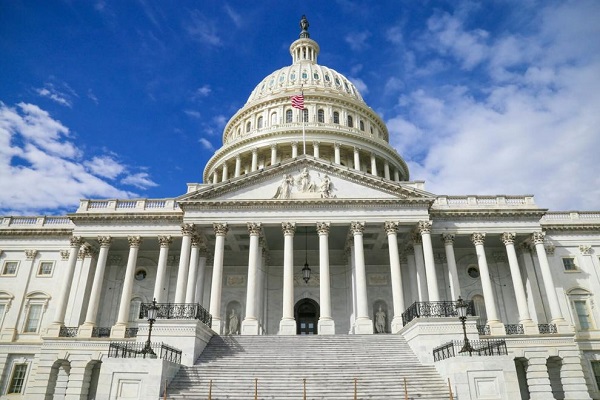Business
DOGE discovers $4.7T in untraceable U.S. Treasury payments

 MxM News
MxM News
Quick Hit:
The Department of Government Efficiency (DOGE), established under President Donald Trump, has discovered that nearly $4.7 trillion in U.S. Treasury payments were processed with an optional, often blank identification code—making them nearly impossible to track. The revelation has prompted immediate changes to federal financial reporting, mandating full transparency on these transactions moving forward.
Key Details:
- DOGE found that the Treasury Access Symbol (TAS), a key financial identifier, was frequently left blank in transactions totaling $4.7 trillion.
- The Trump administration’s watchdog agency worked with the U.S. Treasury to close this loophole, making the TAS field mandatory for all federal payments.
- DOGE continues to uncover and eliminate government waste, already reporting an estimated $55 billion in taxpayer savings through spending cuts and contract renegotiations.
Diving Deeper:
The Department of Government Efficiency (DOGE), spearheaded by Elon Musk under President Donald Trump’s administration, has made a bombshell discovery regarding federal spending. According to the agency, $4.7 trillion in payments were funneled through the U.S. Treasury without clear tracking due to an often-missing Treasury Access Symbol (TAS). This identifier, which links government expenditures to specific budget items, was optional in the federal system—resulting in payments that were nearly impossible to trace.
DOGE announced the finding on X, explaining that the TAS field has now been made mandatory for all federal payments. “As of Saturday, this is now a required field, increasing insight into where money is actually going,” the agency stated. This change is expected to bring a new level of transparency to federal finances, ensuring that taxpayer dollars are properly accounted for.
The revelation coincides with DOGE’s broader mission to root out wasteful government spending. Since its creation via executive order, the agency has reported $55 billion in estimated savings, achieved through fraud detection, renegotiations of contracts, and regulatory cuts. The agency is also working to make its cost-cutting measures fully transparent, committing to updating its financial data twice per week with the goal of transitioning to real-time reporting.
Musk’s leadership at DOGE has sparked both praise and controversy. While conservatives applaud the agency’s aggressive stance on reducing bloated government programs, critics—particularly among Democrats—have raised concerns over its authority to access federal data and cancel government contracts. Attorneys general from 14 states have filed a lawsuit aiming to block DOGE from federal systems, arguing that its executive authority over financial oversight is an overreach.
Despite legal challenges, DOGE recently won a key court battle, with a federal judge in Washington declining to temporarily block its access to sensitive data from several agencies, including the Departments of Labor and Health and Human Services. This ruling is seen as a green light for the Trump administration’s cost-cutting mission to continue.
With the U.S. national debt at record highs, DOGE’s latest discovery raises serious questions about past government financial management. The $4.7 trillion in untraceable payments underscores why the agency was created in the first place—and why Washington’s establishment has resisted its oversight.
Internet
US government gave $22 million to nonprofit teaching teens about sex toys: report

From LifeSiteNews
The Center for Innovative Public Health Research’s website suggests teenage girls make their ‘own decisions’ about sex and not let their parents know if they don’t want to.
For almost a decade, the U.S. government funded a group that actively works to teach kids how to use sex toys and then keep them hidden from their parents to the tune of $22 million.
According to investigative reporter Hannah Grossman at the Manhattan Institute, The Center for Innovative Public Health Research (CIPHR) has been educating minors about sex toys with public funds.
Records show that the millions given to the group since 2016, according to its website, go toward “health education programs” that “promote positive human development.”
However, the actual contents of the programs, as can be seen from comments from CIPHR CEO Michele Ybarra, seem to suggest that its idea of “human” development is skewed toward radical sex education doctrine.
In 2017, CIPHR launched Girl2Girl, which is funded by federal money to promote “sex-ed program just for teen girls who are into girls.” Its website lets users, who are girls between ages 14 and 16, sign up for “daily text messages … about things like sex with girls and boys.”
The actual content of some of the messages is very concerning. Its website notes that some of the texts talk about “lube and sex toys” as well as “the different types of sex and ways to increase pleasure.”
The website actively calls upon teenage girls to make their “own decisions” and not let their parents know if they don’t want to.
Grossman shared a video clip on X of Ybarra explaining how they educate minors about the use of “sex toys” and dealing with their parents if they are found out.
The clip, from a 2022 Brown University webinar, shows Ybarra telling researchers how to prepare “young person(s)” for her research.
She said if they are doing “focus groups,” she will ask them, “Okay, so what happens if somebody comes into the room and sees words like penis and sex toys on your screen — on your computer screen or on your phone? What if it’s your mom?’”
In 2023, CIPHR launched Transcendent Health, which is a sex-education program for minors who are gender confused. This initiative received $1.3 million of federal grant money that expired last month.
Grossman observed that the federal government “should not fund programs that send sexually explicit messages to minors and encourage them to conceal these communications from parents.”
She noted that in order to protect children and “prevent further harm,” U.S. President Donald Trump’s Department of Health and Human Services “should immediately cancel CIPHR’s active contract and deny its future grant applications.”
“By doing so, the Trump administration can send a clear message: Taxpayers will no longer foot the bill for perverted ‘research’ projects,” she noted.
The Trump administration has thus far, through the Department of Government Efficiency (DOGE), exposed billions in government waste and fraud. Many such uses of taxpayer dollars are currently under review by the administration, including pro-abortion and pro-censorship activity through USAID, “Diversity, Equity, and Inclusion and neo-Marxist class warfare propaganda” through the National Science Foundation, and billions to left-wing “green energy” nonprofits through the Environmental Protection Agency.
Business
Canadian Police Raid Sophisticated Vancouver Fentanyl Labs, But Insist Millions of Pills Not Destined for U.S.

 Sam Cooper
Sam Cooper
Mounties say labs outfitted with high-grade chemistry equipment and a trained chemist reveal transnational crime groups are advancing in technical sophistication and drug production capacity
Amid a growing trade war between Washington and Beijing, Canada—targeted alongside Mexico and China for special tariffs related to Chinese fentanyl supply chains—has dismantled a sophisticated network of fentanyl labs across British Columbia and arrested an academic lab chemist, the RCMP said Thursday.
At a press conference in Vancouver, senior investigators stood behind seized lab equipment and fentanyl supplies, telling reporters the operation had prevented millions of potentially lethal pills from reaching the streets.
“This interdiction has prevented several million potentially lethal doses of fentanyl from being produced and distributed across Canada,” said Cpl. Arash Seyed. But the presence of commercial-grade laboratory equipment at each of the sites—paired with the arrest of a suspect believed to have formal training in chemistry—signals an evolution in the capabilities of organized crime networks, with “progressively enhanced scientific and technical expertise among transnational organized crime groups involved in the production and distribution of illicit drugs,” Seyed added.
This investigation is ongoing, while the seized drugs, precursor chemicals, and other evidence continue to be processed, police said.
Recent Canadian data confirms the country has become an exporter of fentanyl, and experts identify British Columbia as the epicenter of clandestine labs supplied by Chinese precursors and linked to Mexican cartel distributors upstream.
In a statement that appears politically responsive to the evolving Trump trade threats, Assistant Commissioner David Teboul said, “There continues to be no evidence, in this case and others, that these labs are producing fentanyl for exportation into the United States.”
In late March, during coordinated raids across the suburban municipalities of Pitt Meadows, Mission, Aldergrove, Langley, and Richmond, investigators took down three clandestine fentanyl production sites.
The labs were described by the RCMP as “equipped with specialized chemical processing equipment often found in academic and professional research facilities.” Photos released by authorities show stainless steel reaction vessels, industrial filters, and what appear to be commercial-scale tablet presses and drying trays—pointing to mass production capabilities.
The takedown comes as Canada finds itself in the crosshairs of intensifying geopolitical tension.
Fentanyl remains the leading cause of drug-related deaths in Canada, with toxic supply chains increasingly linked to hybrid transnational networks involving Chinese chemical brokers and domestic Canadian producers.
RCMP said the sprawling B.C. lab probe was launched in the summer of 2023, with teams initiating an investigation into the importation of unregulated chemicals and commercial laboratory equipment that could be used for synthesizing illicit drugs including fentanyl, MDMA, and GHB.
The Bureau is a reader-supported publication.
To receive new posts and support my work, consider becoming a free or paid subscriber.
Invite your friends and earn rewards
-

 2025 Federal Election2 days ago
2025 Federal Election2 days agoCommunist China helped boost Mark Carney’s image on social media, election watchdog reports
-

 2025 Federal Election1 day ago
2025 Federal Election1 day agoRCMP memo warns of Chinese interference on Canadian university campuses to affect election
-

 2025 Federal Election2 days ago
2025 Federal Election2 days agoFifty Shades of Mark Carney
-

 Energy2 days ago
Energy2 days agoTrump signs four executive orders promoting coal industry
-

 2025 Federal Election2 days ago
2025 Federal Election2 days agoConservative Party urges investigation into Carney plan to spend $1 billion on heat pumps
-

 MAiD2 days ago
MAiD2 days agoDisability rights panel calls out Canada, US states pushing euthanasia on sick patients
-

 Justice2 days ago
Justice2 days agoCanadian government sued for forcing women to share spaces with ‘transgender’ male prisoners
-

 Alberta2 days ago
Alberta2 days agoAlberta takes big step towards shorter wait times and higher quality health care










